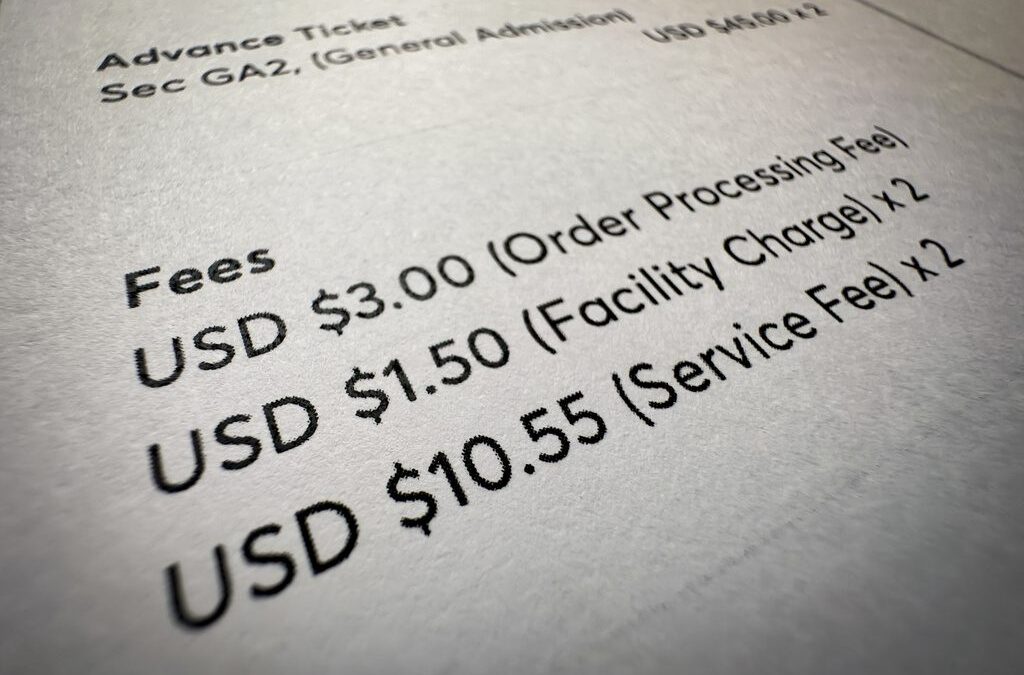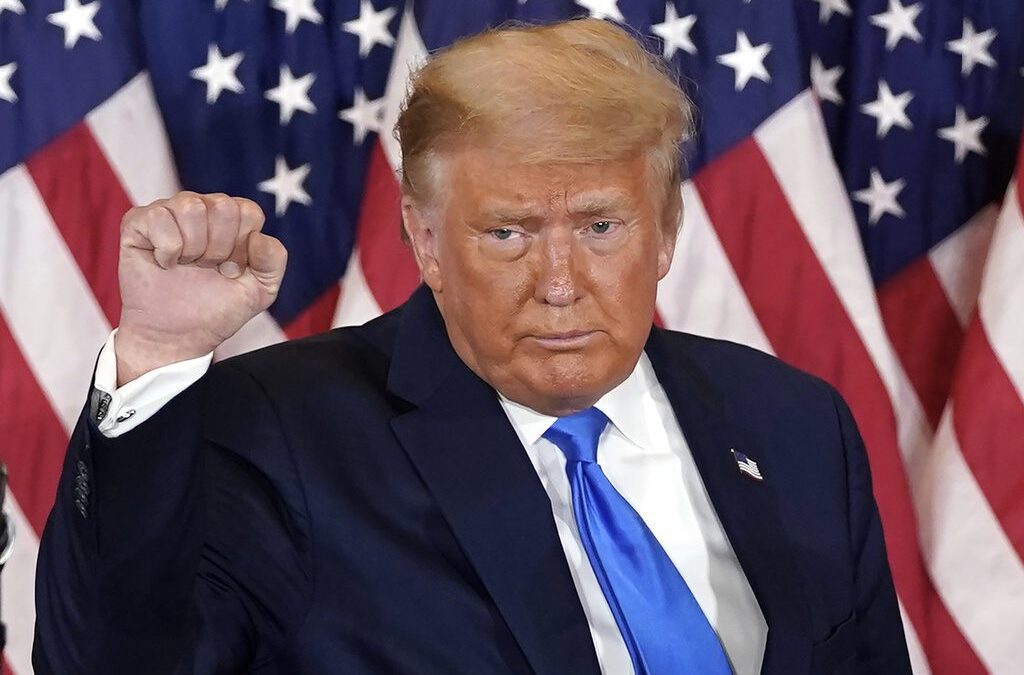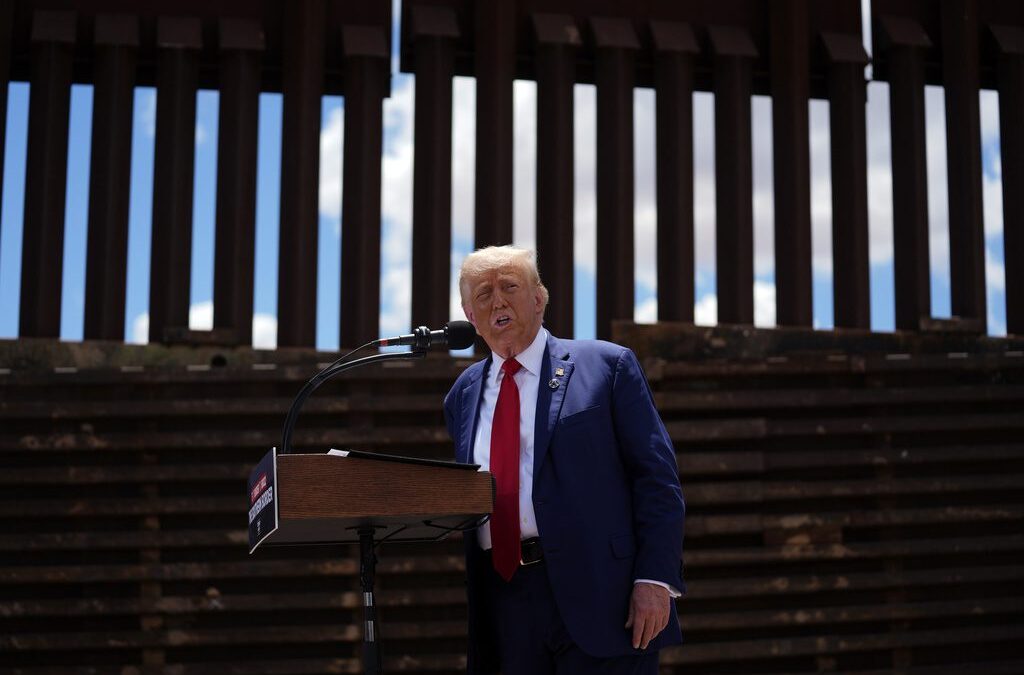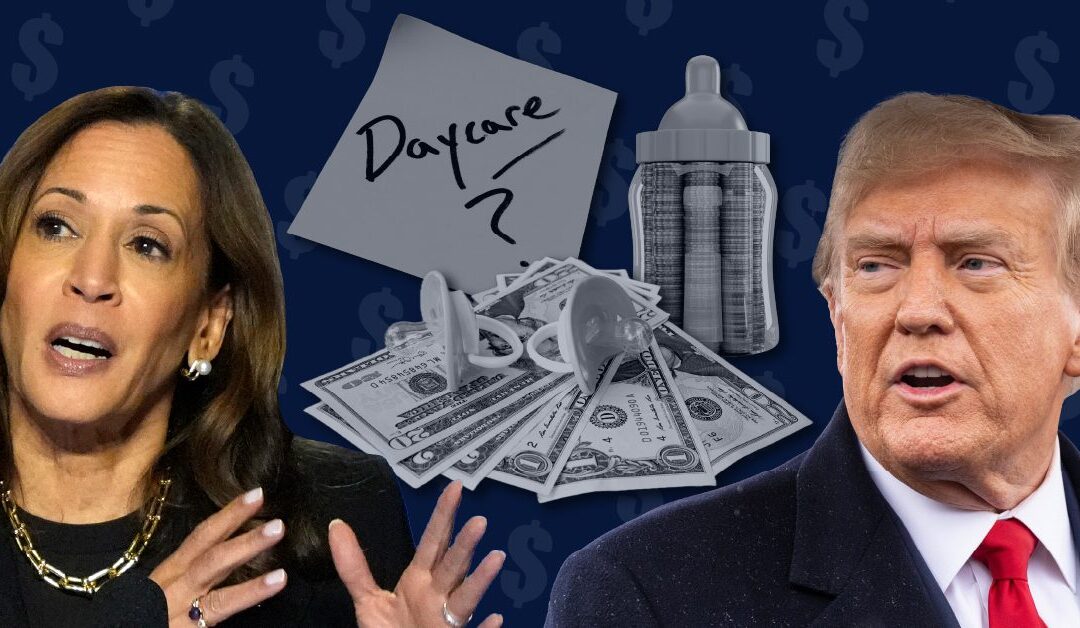
A photo collage of Nevada US Sen. Jacky Rosen (left), Federal Reserve Chairman Jerome Powell (center) and Rosen's Republican challenger Sam Brown.
During a Republican Senate primary debate that year, Brown — who was ultimately unsuccessful in securing the GOP nomination to challenge US Sen. Catherine Cortez Masto (D-Nevada) — criticized the central bank for moving too slowly in raising interest rates as a means to combat inflation, which began to spike that year following pandemic-induced supply chain shortages and the war in Ukraine.
Brown was asked what he would do to rein in inflation, which peaked the following month at 9.1%, and he suggested a single steep rate hike that would stop inflation in its tracks.
“They ought to be raising interest rates at a much more aggressive level to combat inflation,” Brown said at the May 2022 debate, hosted by Nevada Newsmakers. “When we have runaway inflation that’s the highest it’s been in over 40 years, they should be raising rates by two-and-a-half points or more immediately to try and combat that.”
Brown also accused the Fed, whose chairman Jerome Powell was elevated to that role by former Republican President Donald Trump, of acting as a “partisan tool” of the Biden administration.
After Brown explained why he would raise interest rates so steeply, moderator Sam Shad subsequently challenged Brown on whether such a move would plunge the US into a recession. To which Brown retorted that such a move would have been much better for the economy in the long term.
“I’m not saying it’s going to be pretty or easy,” the retired US Army Captain continued. “But I’m talking about what we need to do, is to ensure we’re doing the right thing. Even if it does cause temporary pain.”
Steep rate hikes have generally proven to slow down the economy, said Nicholas Irwin, an economic professor at the University of Nevada, Las Vegas, who specializes in real estate and urban economics. Former Fed Chairman Paul Volcker ran the central bank throughout the 1980s, and utilized rate hikes to fight so-called stagflation, though it did bring the US into a two-year recession, Irwin said.
“We know that would reset it,” Irwin said. “[But] we don’t want to have a recession, so we’re trying to thread the needle between things.”
The Fed, interest rates and inflation, explained
Inflation across the globe spiked following pandemic-era disruptions to supply chains in many key industries, as well as other factors like the war in Ukraine. Consumer prices (i.e. the measure of inflation) are roughly 3.3% higher than they were a year ago, a rate of inflation that is well below the country’s inflationary peak in 2022.
To combat inflation, the Federal Reserve — the nation’s central bank charged with administering monetary policy with a goal of achieving a low, stable rate of inflation — began raising interest rates, effectively making it more expensive to borrow money.
Throughout much of 2022 and 2023, the Fed raised rates in small increments over 11 consecutive meetings, culminating with an average interest rate of 5.33% which has been in place since July of last year.
Irwin said this has largely been an effective strategy. Powell has said the Fed’s goal has been to achieve a so-called “soft landing” by raising interest rates enough to cool consumer spending to reign in prices just enough to stave off an economic recession.
“The Fed has never done this before,” said Irwin. “We’re literally seeing an experiment in real time.”
VIDEO: Northern Nevada is facing an affordable housing crisis
With the worst of the inflation crisis seemingly in the rearview mirror, Democrats like Nevada Sen. Jacky Rosen have argued that keeping interest rates high needlessly inflicts financial pain on Americans, especially first-time homebuyers and those seeking affordable housing. Rosen, who will face off against Brown in November, has joined her Democratic colleagues in urging the Fed to lower interest rates as a way to provide relief for expensive housing costs, and has sent two letters to Powell demonstrating the effect high rates have on Nevadans.
For his part, Powell has maintained the Fed is willing to keep interest rates elevated in order to achieve its target rate for inflation (2%), and has been mum on the timeline of potential cuts.
Brown, meanwhile, has continued to advocate keeping interest rates high and has criticized Rosen for wanting to cut rates too soon. The Nevadan has obtained audio of remarks Brown made to the Nevada Republican Club in February, in which he suggested he still supported higher interest rates and blamed Rosen and Democratic spending policies for inflation.
“Our interest rates are high, housing affordability is an issue here than in most places in the country,” Brown said. “Jacky Rosen’s solution is to tell the Fed to lower interest rates. I’m afraid she doesn’t know how economics work. We can’t continue to spend the way we spend, and then demand the Fed lower interest rates and inflation go down.”
When asked by The Nevadan if Brown still favors keeping interest rates high, campaign communications director Kristy Wilkinson in a statement criticized Rosen’s support of President Joe Biden’s economic policies.
“From skyrocketing prices to the second highest unemployment in the country, Jacky Rosen’s rubber stamp of Bidenomics has been disastrous for Nevada,” Wilkinson said. “To make matters worse they have presided over interest rates that are so high they have led to record-setting credit card defaults, car loan defaults, and home ownership being almost entirely out of reach because no one can qualify for a loan.”
As of June, Nevada’s unemployment rate was 5.1% just shy of California (5.2%) for highest in the nation — but is substantially lower than when Biden took office, when it was at 8.9%. Nevada recorded a 4.4% unemployment rate in Feb 2020 but ballooned to an all-time high of 30.6% two months later after pandemic-induced closures decimated the state’s tourism-based economy.
Rosen has argued that the current interest rate has slowed the economy and is failing to keep inflation under the Fed’s preferred 2% target. In a letter sent earlier this month, Rosen told Powell she believes interest rates are also keeping current renters who could otherwise be a first-time homebuyer out of the market, thus creating a backlog of available units for other prospective renters.
An April report from the Mortgage Bankers Association trade group found Nevada had the highest average monthly payment for new mortgages, relative to the homeowner’s income, with factors such as increased loan principal and rising mortgage rates to blame. The average interest rate for a 30-year, fixed rate mortgage in Nevada was 6.99% as of Tuesday, according to NerdWallet, slightly higher than the US average of 6.87% as home loan interest rates remain near their highest levels since 2002.
Mortgage rates are tied directly to the Fed’s interest rate, said Irwin, who added that Nevada is a unique housing market because of the limited amount of land it can develop, and that demand in the Las Vegas valley in particular is outpacing supply.
Irwin said the average mortgage payment on a $500,000 house is roughly $1,200 more per month than it was five years ago — solely because of high interest rates. In Rosen’s June 10 letter to Powell, she states that high interest rates translate to increased overhead for construction materials to build homes as well as increased mortgage rates for landlords, who often pass the surcharge to tenants, making rental units more expensive.
That means those seeking a new home are left with little to choose from, Irwin said. But they may commit to a mortgage anyway for fear of losing out.
“We’re seeing a lot of houses, that, even though the interest rates aren’t super friendly to buyers, we’re still seeing houses transact pretty quickly,” Irwin said. “I think a lot of buyers are now facing the idea that this is the future for at least a couple of years.”
Political volley
The Fed considers itself an independent agency, but its eight board members are appointed by the president and must be approved by Congress. While the Fed acts in a nonpartisan fashion, its potential action (or lack thereof) on interest rates have come under scrutiny from Democrats and Republicans alike. In February, Trump said if Powell lowers interests rates before the Nov. 5 general election, it would swing the election to Democrats.
“It looks to me like he’s trying to lower interest rates for the sake of maybe getting people elected, I don’t know,” Trump said Feb. 2, even as the Fed has not lowered interest rates since he was last president in 2020.
But regardless of the housing outlook, Irwin stressed the importance of keeping the Fed a nonpartisan entity. Caving to one side over the other, Irwin said, could have lasting effects on the Fed’s reputation and trust in US financial institutions.
Undermining that could also have dire consequences for the economy, Irwin said.
“Part of the reason the Federal Reserve works so well is that it has this perception of independence that it does not respond to the whims of the legislative or executive branches, and that provides credibility to the market as a whole,” Irwin said.
“If the Fed starts responding to that political pressure, then the market is less likely to believe the things they say, and that can create a whole host of downstream issues. If the Fed is no longer a credible actor, then we run into a lot of issues.”

Sick of hidden fees on concert tickets and hotel stays? A new federal rule bans them.
Now, live event businesses and hotels must clearly list their prices in both their advertising and pricing information. American consumers on...

Trump’s tariff plan would raise prices and ‘reduce the living standard of Americans,’ economists say
Trump’s plan would effectively be a sales tax that disproportionately harms working-class families and could cause a trade war that hurts US...

Trump’s tariff and tax plan would raise taxes on 95% of Americans, report finds
In response to the report, the Harris-Walz campaign released an analysis of its own, outlining how Trump’s agenda would raise costs for over 1.2...

Trump’s economic plans would worsen inflation, experts say
Mainstream economists warn that Trump's plans to impose huge tariffs on imported goods, deport millions of migrant workers, and demand a voice in...

Harris wants to give working families a tax cut and raise taxes on corporations. Trump would do the opposite.
Kamala Harris has proposed increasing the corporate tax rate, expanding the child tax credit, and cutting taxes for more than 100 million working...

Harris wants to cap child care costs and expand the child tax credit. Trump’s solution? Tariffs.
Harris has proposed capping families’ child care costs to 7% of their income and offering families of newborns up to $6,000 in the first year of the...




